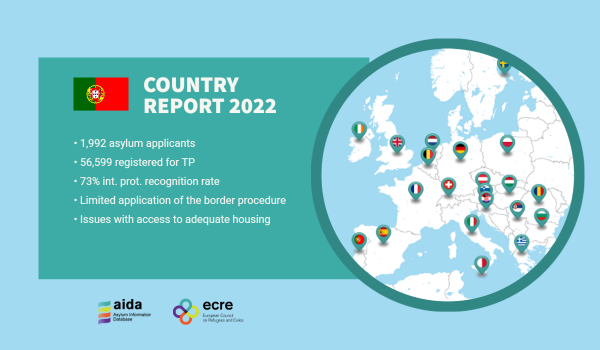The updated AIDA Country Report on Portugal provides a detailed overview on legislative and practice-related developments in asylum procedures, reception conditions, detention of asylum seekers, the content of international protection, as well as the procedure for and content of temporary protection in 2022.
In 2022, Portuguese asylum authorities registered a total of 1,992 applications for international protection (including 150 presented by persons relocated to Portugal). However, the NGO Portuguese Refugee Council was notified that 2,135 applications had been registered throughout the year. This difference may be due to the fact that asylum applications made by Ukrainian citizens before the activation of the Temporary Protection Directive were considered as being “moved” to the temporary protection regime and as such not registered among asylum applicants. Asylum applicants enjoyed a relatively high recognition rate, which stood at 73% overall. A total of 33 decisions of cessation of subsidiary protection were issued by the Portuguese authorities throughout 2022, mostly concerning nationals of Ukraine (19) and DRC (7). In 2022, Portugal pledged to resettle 300 persons from Türkiye, Egypt and Jordan. However, according to the information available to CPR, no one was resettled during the year.
Access to adequate housing is identified as a major issue within the national context by asylum seekers, refugees and NGOs. Factors such as high prices, and contractual demands including high deposits, need of guarantors and proof of income hinder the capacity of asylum seekers and refugees to access the market directly, and that of frontline service providers to increase reception capacity. Consequently, asylum seekers and refugees often have to resort to overcrowded or sub-standard housing options when accessing the private housing market. Positively, an amendment to the Asylum Act enacted in August 2022, determined that asylum seekers are entitled to the right to work from the moment of the application for international protection.
In January 2022, the European Commission announced having opened infringement procedures to Portugal “for failing to transpose in a fully conform manner all provisions” of both the Qualification and the Reception Conditions Directives. As previously reported, in 2020, the Government announced its intention to conduct a structural reform of SEF (asylum authority). However, the creation of the new Agency was only approved by the Government in April 2023. According to the information publicly available, minorities were also added to the mandate of the entity, and, as such, it will be called Agency for Minorities, Migration and Asylum (APMMA). It is expected to start its operations within six months.
In the course of 2022, the persons requesting registration for temporary protection to the Portuguese authorities were 56,599. Out of these, 44,524 were Ukrainian nationals, and 12,075 third country nationals that lived in Ukraine. By the end of the year, there were 45,613 beneficiaries of temporary protection registered in the country. Some issues were reported by persons whose registration for temporary protection is refused, as they are not issued a written decision, nor informed of the right to appeal on a systematic basis; it is not known how many people were refused registration, as data on this matter was not available.
For further information:
- Find comparative information in the Asylum Information Database (AIDA) managed by ECRE.

